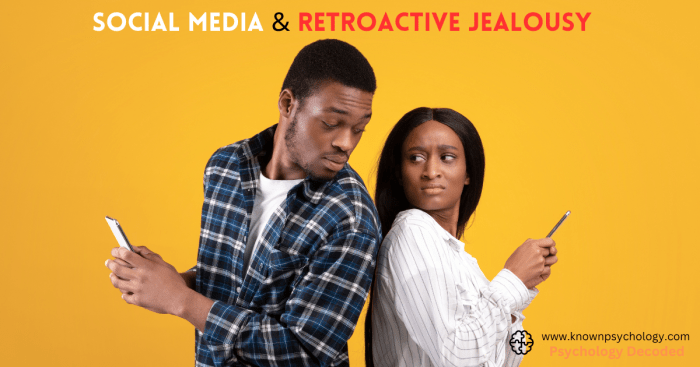How social media fuels jealousy? This exploration dives deep into the often-hidden ways curated online personas and relentless comparisons contribute to feelings of inadequacy and envy. We’ll dissect the illusion of perfection, the pressure to conform, and the impact on relationships, all fueled by the constant stream of idealized content on various platforms.
From meticulously crafted photos to carefully selected captions, social media profiles often present an unrealistic and unattainable image of happiness and success. This curated version of reality can leave us feeling inadequate and envious, even when we know it’s not truly representative of someone’s life. We’ll examine the subtle yet powerful ways these idealized portrayals can negatively impact our self-esteem and relationships.
We’ll also consider how different demographics are affected differently.
The Illusion of Perfection

Social media, while connecting us, often presents a highly curated and idealized view of reality. Users meticulously craft their online personas, showcasing highlights and carefully concealing imperfections. This carefully constructed image, while seemingly harmless, can have a profound impact on our self-perception and contribute to feelings of inadequacy and social comparison. This curated reality fosters an illusion of perfection, leading to a disconnect between the online persona and the lived experience.The curated nature of social media profiles stems from a desire for validation and connection, but often leads to a distorted perception of others’ lives and our own.
People often present their best selves, highlighting achievements, relationships, and experiences that align with the perceived social norms and ideals of the platform. This curated image, though frequently unintentional, becomes a potent source of comparison and potentially fuels feelings of inadequacy.
Curated vs. Uncurated Social Media Profiles
Social media users often create an idealized online presence, contrasting sharply with their everyday realities. This discrepancy can lead to a disconnect between the projected image and the actual lived experience, contributing to feelings of inadequacy and comparison.
| Aspect | Curated Profile | Uncurated Profile | Example |
|---|---|---|---|
| Relationships | Perfect, happy couples; frequent romantic gestures; highlight only positive interactions | Everyday ups and downs of a relationship; arguments, disagreements, and challenges | A couple posting pictures of romantic dinners and vacations but never showing a single argument or disagreement |
| Travel | Pictures of exotic destinations, luxurious accommodations, and flawless experiences | Travel experiences that include delays, unexpected costs, or moments of frustration | A user posting only stunning photos of a trip, omitting details of travel hassles or unexpected weather |
| Lifestyle | Images of a healthy, active, and aesthetically pleasing lifestyle; highlight only the positive aspects | Days filled with mundane tasks, moments of stress, or a lack of immediate gratification | Posting pictures of a perfect workout routine and healthy meals, while neglecting moments of laziness or less-than-ideal meals |
| Achievements | Celebrating milestones, achievements, and successes | Experiences that did not turn out as expected; times of struggle and failures | Showcasing a promotion or academic achievement, while omitting any periods of struggle or challenges leading up to that moment |
Psychological Impact of Idealized Portrayals
The consistent exposure to these idealized portrayals can have a significant psychological impact on individuals. Seeing others’ curated lives, filled with seemingly perfect moments, can trigger feelings of inadequacy, envy, and even anxiety. This comparison can lead to a distorted self-image, impacting self-esteem and potentially leading to mental health challenges. People may feel pressured to conform to these unrealistic standards, leading to stress and unhappiness.
Research consistently shows a correlation between social media use and negative emotions like envy and anxiety.
Social media often magnifies feelings of inadequacy and jealousy, especially when we compare our lives to curated online personas. Learning to navigate these feelings is a challenge, but it’s often easier said than done. One important life lesson, especially for those with siblings, is learning to accept and appreciate our own journeys. This is particularly relevant when considering the 15 important things you learn the elder sibling 15 important things you learn the elder sibling.
Ultimately, recognizing that social media often presents a distorted view of reality can help us manage those envious feelings. It’s about focusing on our own path and appreciating our unique experiences, not comparing ourselves to others.
Examples of Idealized Social Media Posts
Several types of social media posts contribute to the illusion of perfection. For instance, frequent posts of flawless meals, luxurious vacations, or seemingly effortless achievements are common. Similarly, perfectly posed photos and edited images can further perpetuate the unrealistic standards. A lack of transparency, where users present only positive aspects of their lives, contributes to the illusion.
These seemingly perfect posts can lead to social comparison and feelings of inadequacy.
Comparison and Competition
Social media platforms, designed for connection, often inadvertently become breeding grounds for comparison and competition. The curated, often idealized, portrayals of others’ lives can lead to feelings of inadequacy and jealousy, especially when juxtaposed against our own perceived reality. This constant evaluation can have profound effects on our self-esteem and mental well-being, impacting individuals across various demographics.The curated nature of social media profiles fosters a climate of comparison.
Scrolling through Instagram, it’s easy to feel like everyone else is living this perfect life. That curated highlight reel fuels jealousy, making us question our own relationships. Are you truly happy with what you have, or are you settling for less? Take this quick test to find out are you satisfied with your relationship settling for less take this test find out.
Ultimately, social media’s idealized portrayals can trick us into comparing ourselves unfavorably, leading to unnecessary anxieties and potentially undermining genuine connections.
Users are presented with carefully constructed narratives of success, happiness, and fulfillment. These narratives, though often misleading, can trigger feelings of inadequacy and jealousy when viewed in contrast to our own lives, which may appear less glamorous or successful.
Social Media Comparison and Jealousy
Social media platforms are brimming with content that can easily trigger feelings of jealousy and inadequacy. Pictures of exotic vacations, lavish parties, and seemingly perfect relationships often serve as stark reminders of perceived shortcomings in our own lives. These carefully constructed images can lead to a distorted view of reality, where we perceive others’ lives as significantly more fulfilling than our own.
Triggers of Jealousy on Social Media
Various social media activities can spark feelings of jealousy. The constant barrage of idealized images and updates from friends, acquaintances, and even strangers can contribute to a sense of inadequacy. Success stories, extravagant purchases, and seemingly effortless achievements can trigger negative feelings, especially when perceived in contrast to our own experiences. These comparisons can extend to personal attributes like physical appearance, career achievements, or relationship status.
A well-crafted caption and carefully selected hashtags can amplify the perceived difference, reinforcing these negative emotions.
Demographic Impacts of Social Media Comparison
The effects of comparing one’s life to idealized versions on social media vary across different demographics. Teenagers, for example, are particularly vulnerable due to their ongoing self-discovery and development of self-esteem. The pressure to conform to perceived social norms and the constant exposure to idealized images can significantly impact their mental health. Adults, while possibly more resilient, can still experience similar feelings of inadequacy and jealousy, particularly when comparing their career paths, relationships, or financial situations.
The pressure to maintain a certain image can negatively impact their self-worth and overall well-being.
Social Media Platforms and Comparison Triggers
| Social Media Platform | Common Content Triggering Comparison | Examples | Impact on Users |
|---|---|---|---|
| Photos of lavish vacations, designer clothes, curated lifestyle | Travel posts, lifestyle content, influencer promotions | Feelings of inadequacy, pressure to maintain a certain image, body image issues | |
| Updates about promotions, new homes, relationship milestones | Status updates, group posts, events | Feelings of inadequacy, pressure to share achievements, fear of missing out (FOMO) | |
| TikTok | Short-form videos showcasing effortless skills, trendy content | Dance trends, viral challenges, quick-cut edits | Pressure to be trendy, perceived lack of skill, unrealistic expectations |
| Discussions about achievements, trending topics, news | Public debates, professional discussions, news coverage | Feelings of inadequacy, comparison based on achievements, potential cyberbullying |
Social Validation and Pressure
Social media has become a powerful force in shaping our perceptions of ourselves and the world around us. Beyond the superficial appeal of perfect lives and curated images, social media exerts subtle pressures to conform to perceived social norms. This pressure often manifests as a relentless pursuit of social validation, leading to feelings of inadequacy and jealousy when we perceive others as succeeding where we feel we are falling short.The constant stream of curated content, highlighting the “best” versions of others’ lives, creates a warped lens through which we view reality.
This distortion fosters a sense of competition and comparison, impacting our self-worth and contributing significantly to feelings of jealousy. It’s important to understand how social media influences our perceptions of social validation and acceptance to navigate its potential pitfalls.
Social Media’s Influence on Perceptions of Social Validation
Social media platforms present carefully constructed narratives, often showcasing idealized versions of reality. Users meticulously curate their online personas, highlighting achievements, relationships, and experiences that are often far from representative of their true lives. This curated content significantly influences our perception of social validation, creating an environment where superficial displays of happiness and success are equated with true worth.
We are constantly bombarded with messages implying that happiness and acceptance are directly tied to online presence and the number of likes, followers, or comments received.
Pressure to Conform to Perceived Social Norms
The pressure to conform to perceived social norms on social media is immense. Trends, filters, and even the very structure of platforms often dictate what is considered “acceptable” or “desirable.” Users are encouraged to adhere to these standards, often leading to feelings of inadequacy and anxiety when they perceive themselves as falling short. This pressure to conform extends beyond aesthetics and encompasses lifestyle choices, opinions, and even personal values.
Scrolling through feeds can make us feel inadequate, highlighting perfect vacations and seemingly effortless lifestyles. But what if, instead of comparing, we focused on practical steps to improve our financial well-being? Check out these 10 tips how live well even with only one income 10 tips how live well even with only one income to gain control over our finances.
Ultimately, realizing that everyone’s journey is different, and focusing on our own progress, can help us overcome the constant pressure to keep up with curated online personas.
Contribution to Feelings of Jealousy
The curated perfection presented on social media inevitably contributes to feelings of jealousy. When users compare their own lives, often unfiltered and imperfect, to the seemingly flawless online representations of others, feelings of inadequacy and envy are bound to arise. This comparison fuels the desire to emulate the perceived successes and lifestyles of others, often leading to a vicious cycle of discontent.
Examples of Unrealistic Expectations
Social media platforms often create a climate of unrealistic expectations. The frequent display of extravagant vacations, flawless appearances, and seemingly effortless achievements sets a standard that is virtually impossible to maintain for most users. This creates a sense of disconnect between the curated online personas and the realities of daily life, contributing to feelings of inadequacy and ultimately, jealousy.
Identifying and Addressing Pressure to Conform
Recognizing the pressure to conform is the first step toward mitigating its negative effects. It’s crucial to be aware of the curated nature of social media content and to cultivate a healthy skepticism toward the idealized images presented. Practice self-compassion and focus on your own journey, rather than striving to meet unattainable standards set by others. Limit your exposure to social media, especially when you’re feeling vulnerable or self-conscious.
Social Media Trends and Their Impact on Social Validation Pressures
| Social Media Trend | Description | Impact on Social Validation Pressure | Examples |
|---|---|---|---|
| Influencer Marketing | Promoting products or lifestyles through social media personalities | Creates pressure to achieve a specific lifestyle or appearance. | “Perfect” home decor, luxury travel, fitness regimens. |
| Filtered Content | Images and videos altered to create a desired aesthetic | Encourages unrealistic expectations of beauty and perfection. | Photoshopped images, flawless makeup, perfect poses. |
| Social Comparison | Comparing oneself to others based on social media activity | Increases feelings of inadequacy and envy. | Comparing achievements, relationships, or material possessions. |
| Social Challenges | Viral challenges promoting specific behaviors or activities | Promotes a need to participate and maintain a certain image. | Dancing challenges, specific fashion trends. |
The Role of Intimacy and Relationships

Social media has become an undeniable force in shaping our perceptions of relationships and intimacy. It provides a constant stream of curated images, often showcasing idealized versions of partners, families, and friendships. This curated reality can profoundly impact our own relationships, fostering feelings of inadequacy and jealousy. The carefully constructed narratives presented online can lead to a disconnect between the perceived and the actual, ultimately influencing our understanding of love, connection, and belonging.The curated perfection often portrayed on social media creates a significant pressure on individuals to conform to these idealized standards.
This can lead to feelings of inadequacy and a distorted view of intimacy and relationship dynamics. The impact of this phenomenon extends beyond romantic relationships, impacting platonic friendships and family bonds as well.
Influence on Perceptions of Relationships and Intimacy, How social media fuels jealousy
Social media platforms often present a highly selective and often unrealistic view of relationships. Users typically highlight the positive aspects of their lives, downplaying or concealing any struggles or challenges. This can lead to a distorted perception of intimacy and the overall health of a relationship. The constant exposure to seemingly flawless partnerships can lead to feelings of dissatisfaction or jealousy in individuals’ own relationships.
Curated Representations and Jealousy
The carefully crafted portrayals of relationships on social media can fuel jealousy and comparison. Couples often post pictures of romantic getaways, intimate moments, and shared achievements. This carefully selected content, while seemingly positive, can foster feelings of inadequacy and insecurity in those who view it. These posts might portray an image of perfect happiness, which can contrast sharply with the reality of an individual’s own relationship.
Perceived Inadequacy in Relationships
Social media posts can inadvertently create a sense of perceived inadequacy in relationships. A constant stream of seemingly idyllic moments, shared experiences, and affectionate gestures can make individuals in their own relationships feel as if their connections are lacking. Seeing others seemingly effortlessly navigate relationship challenges can lead to feelings of inadequacy and comparison. This comparison is often skewed because social media does not offer a complete picture of the individuals or their relationships.
Impact on Perceptions of Partner’s Lives
Social media can significantly impact perceptions of a partner’s life, particularly when one partner is more active on social media. Constantly seeing their partner interacting with others online, sharing experiences, and engaging in activities might lead to suspicions, jealousy, or a sense of isolation in the partner who feels less involved in the online sphere. This effect is more prominent when the shared experience is viewed through a filter of perceived perfection, highlighting a lack of transparency.
Impact on Different Relationship Types
The impact of social media on relationships extends beyond romantic partnerships. Platonic friendships, family dynamics, and even professional collaborations can be influenced by the curated representations found online. The pressure to portray a perfect image can negatively affect the perceived quality of these relationships. While the effect on romantic relationships might be more obvious due to their intimate nature, platonic relationships can still be negatively affected by social media’s curated reality.
Social Media’s Impact on Relationship Stages
| Relationship Stage | Positive Impact | Negative Impact | Mitigation Strategies |
|---|---|---|---|
| Initial Stages | Increased visibility and potential connection | Pressure to present a perfect image, fostering unrealistic expectations | Focus on genuine interaction and avoid comparing experiences |
| Established Relationships | Opportunities for shared experiences and communication | Potential for jealousy and comparison, leading to insecurity | Open communication, establishing boundaries, and focusing on shared values |
| Challenges in Relationships | Potential for support and advice from a wider network | Heightened pressure to address issues publicly, potentially damaging trust | Seek professional help, maintain privacy, and prioritize open communication |
The Impact of Social Media on Self-Esteem
Social media, while offering connection and information, has a significant and often underestimated impact on our self-esteem. The curated and often idealized portrayals of others’ lives can create a powerful comparison that fuels feelings of inadequacy and dissatisfaction. This article delves into the correlation between social media use and self-esteem, highlighting the negative impacts and offering strategies to mitigate them.Social media’s ability to highlight the best moments and achievements of others can lead to a distorted perception of reality.
We tend to see only the filtered, positive aspects of their lives, leading to a comparison that often results in feelings of inadequacy and diminished self-worth. This effect is particularly potent for younger individuals whose self-concept is still developing.
Correlation Between Social Media Use and Self-Esteem
Social media use is directly correlated with fluctuations in self-esteem. Studies show a negative correlation between the time spent on social media and measures of self-esteem. Individuals who spend excessive time comparing themselves to others on social media often report lower self-esteem and higher levels of anxiety and depression.
Negative Impacts of Social Media Use on Self-Esteem
Social media use can negatively impact self-esteem in several ways:
- The Illusion of Perfection: Social media often presents a highly idealized and unrealistic view of others’ lives. This can lead to feelings of inadequacy and pressure to conform to an unattainable standard of beauty, success, or lifestyle. Individuals may feel pressured to present a flawless image, exacerbating feelings of insecurity.
- Comparison and Competition: The constant stream of curated content fuels a comparison game. Users often compare their own lives, experiences, and achievements to those presented on social media. This comparison can lead to feelings of inadequacy, jealousy, and a sense of competition.
- Social Validation and Pressure: Social media relies heavily on likes, comments, and shares as a form of validation. The need for external validation can lead to a dependence on social media for self-worth, and a sense of pressure to constantly maintain an image that garners approval.
How Social Media Feeds a Cycle of Negative Self-Perception
The cycle begins with exposure to idealized content, leading to comparison. This comparison breeds feelings of inadequacy, which in turn, may lead to further social media use as a means of seeking validation or attempting to emulate the idealized lives of others. This cycle can be difficult to break, creating a negative feedback loop that diminishes self-worth.
Strategies to Combat the Negative Impact of Social Media on Self-Esteem
Developing healthy coping mechanisms and strategies to manage social media use is crucial.
- Mindful Consumption: Be intentional about the content you consume. Limit exposure to content that triggers negative feelings. Focus on content that inspires, motivates, or educates.
- Setting Boundaries: Establish clear time limits for social media use. This can help prevent excessive scrolling and comparison.
- Cultivating Self-Compassion: Practice self-compassion and remind yourself that social media often presents an incomplete and unrealistic picture of reality.
- Focusing on Authentic Connections: Prioritize real-life interactions and relationships. This can help counter the pressure to maintain a perfect online persona.
Impact Across Different Age Groups
The impact of social media on self-esteem varies across age groups. Teenagers and young adults are particularly vulnerable due to their developing self-concept. Older adults may also experience negative impacts, but often with different facets, such as feeling left behind or experiencing social isolation from not participating in social media.
Self-Esteem Building Strategies in a Social Media Context
| Strategy | Social Media Application | Example | Benefits |
|---|---|---|---|
| Mindful Consumption | Unfollow accounts that trigger negative feelings. Curate your feed to include positive and supportive content. | Unfollow accounts that post excessive amounts of filtered photos. Follow accounts that share positive affirmations or inspirational quotes. | Reduces comparison and increases positive reinforcement. |
| Setting Boundaries | Schedule specific times for social media use. Turn off notifications during non-social media hours. | Set a daily limit for social media use. Turn off notifications during work or study hours. | Reduces compulsive use and improves focus on other tasks. |
| Cultivating Self-Compassion | Acknowledge that social media profiles often don’t reflect reality. Practice self-acceptance and focus on personal growth. | Remind yourself that others may be sharing idealized versions of their lives. Focus on your own strengths and accomplishments. | Reduces the impact of comparison and fosters self-love. |
| Authentic Connections | Use social media to connect with people who support you and share your interests. Engage in meaningful conversations. | Connect with friends and family members through social media. Join groups that align with your interests. | Builds a supportive network and promotes a sense of belonging. |
Addressing and Managing Jealousy: How Social Media Fuels Jealousy
Social media’s pervasive influence on our lives often leads to feelings of jealousy. This is fueled by curated portrayals of others’ lives, often highlighting the positive and downplaying the negative. Navigating these feelings requires proactive strategies and a conscious approach to managing our online interactions. It’s crucial to remember that the online world rarely reflects the full spectrum of reality.Feeling envious or jealous isn’t inherently bad; it’s a natural human emotion.
However, unchecked jealousy can be detrimental to our mental well-being and relationships. The key is to understand the triggers, develop healthy coping mechanisms, and cultivate a more balanced perspective on our own lives and the lives of others as depicted on social media.
Setting Boundaries on Social Media
Establishing clear boundaries on social media use is essential for mitigating jealousy. This involves understanding what content you are exposed to and how it affects you. Recognizing your personal triggers and limiting your exposure to content that consistently elicits negative emotions is crucial. For example, if scrolling through Instagram consistently leaves you feeling inadequate, consider reducing the time spent on that platform or unfollowing accounts that provoke this response.
It’s about making conscious choices to control your digital environment and prevent it from dominating your thoughts and feelings.
Disconnecting from Social Media
Regular disconnection from social media is vital for mental well-being. Taking breaks, even short ones, allows you to step away from the constant stream of curated content. Scheduled breaks, for instance, during meals or before bed, can be highly effective. Consider designating specific times when you’re not allowed to access social media to give yourself space from the comparison trap.
Moreover, consider taking a digital detox—a complete break from social media—for a specific period, such as a weekend or a week.
Focusing on One’s Own Journey and Accomplishments
Constantly comparing oneself to others on social media can lead to feelings of inadequacy. Shifting the focus to your own unique journey and achievements is paramount. This involves recognizing your own progress, appreciating your strengths, and celebrating your milestones. Keeping a journal of your personal achievements, no matter how small, can serve as a powerful reminder of your own progress.
Reflecting on your personal journey and appreciating your own accomplishments, no matter how seemingly insignificant, will build a more balanced perspective.
Reframing the Perception of Social Media Content
Social media often presents an idealized version of reality. Developing the skill to reframe this content is crucial. Recognize that the content you see is often carefully selected and curated, showcasing highlights, not the full picture. Instead of viewing social media content as a reflection of reality, understand it as a carefully constructed presentation. Think about the effort and time that might go into carefully crafting a perfect picture.
By acknowledging this curated nature, you can prevent yourself from falling into the trap of comparison.
Coping Mechanisms for Managing Jealousy
| Coping Mechanism | Description | Example | Potential Benefits |
|---|---|---|---|
| Mindfulness Meditation | Focusing on the present moment without judgment can help manage anxious thoughts and feelings associated with jealousy. | Practicing 5-10 minutes of mindful breathing exercises daily. | Reduced stress, increased self-awareness, improved emotional regulation. |
| Journaling | Writing down your thoughts and feelings about jealousy can help process them and gain perspective. | Writing about specific social media posts that triggered jealousy, exploring the underlying emotions. | Increased self-understanding, clarity on triggers, emotional release. |
| Positive Affirmations | Repeating positive statements about yourself and your worth can help counteract negative feelings. | “I am capable,” “I am worthy,” “I am enough.” | Increased self-esteem, boosted confidence, improved self-image. |
| Seeking Support | Talking to trusted friends, family members, or a therapist can help validate your feelings and provide guidance. | Discussing feelings of jealousy with a friend or family member. | Emotional support, perspective from others, coping strategies. |
Concluding Remarks
In conclusion, the pervasive influence of social media on our feelings of jealousy is undeniable. By understanding the mechanisms behind this phenomenon—from the illusion of perfection to the pressure to conform—we can begin to navigate the digital landscape with greater awareness and self-compassion. Ultimately, cultivating a healthy relationship with social media involves recognizing its potential pitfalls and actively working to mitigate their negative impacts on our well-being.
This involves setting boundaries, focusing on our own journeys, and re-evaluating the value we place on the curated narratives we encounter online.











